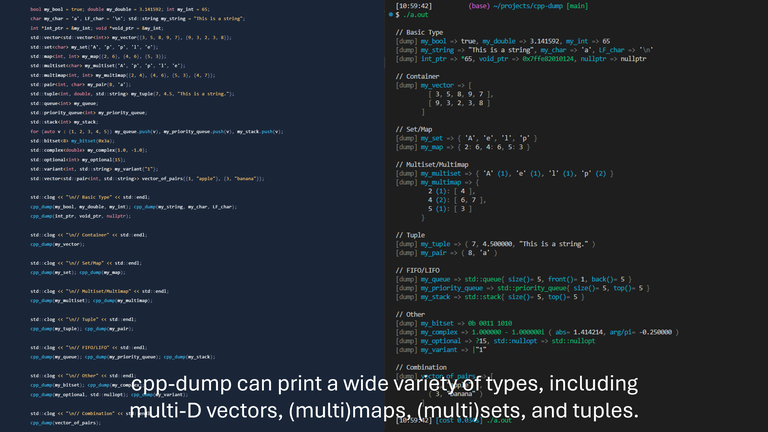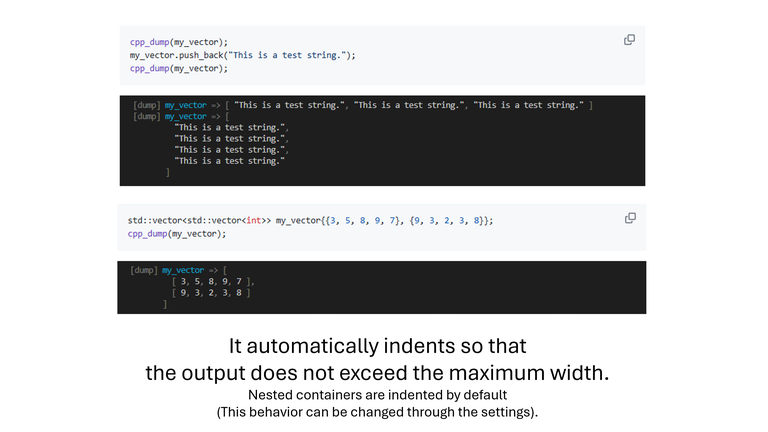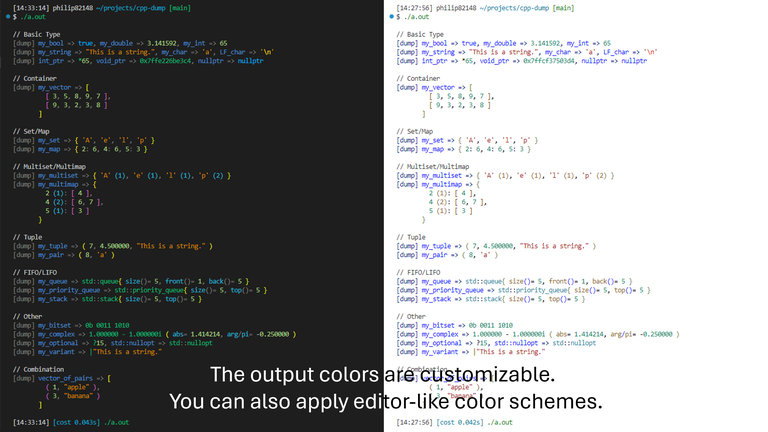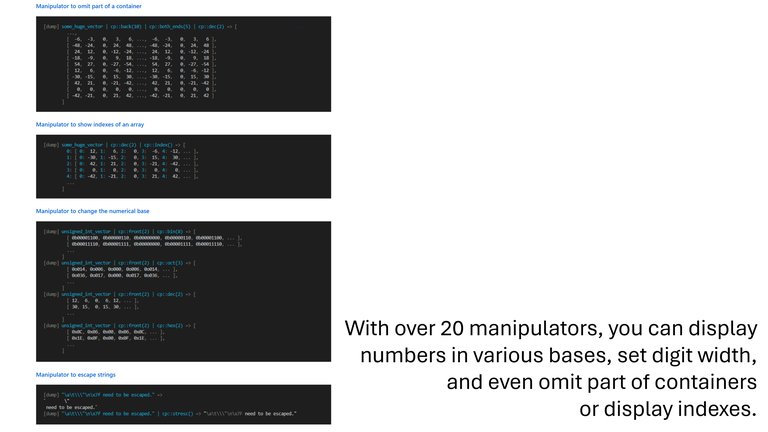Hi Codeforces! I'm a Japanese graduate student, and I've been programming as a hobby since I was 11. I started CP last year, and since then, I've been working on a C++ debugging library that can print variables of almost any type, like vectors, maps, tuples, and more. In this blog, I want to share it with you. Link: https://github.com/philip82148/cpp-dump
Feature Summary
A Wide Variety of Supported Types Section
Example Code
Large Image
Auto Indent Section
Example Code
Large Image
Customizable Output Color Section
Example Code
Large Image
20+ Manipulators to Change the Display Style Section
Example Code
Large Image
- The string representation of variables is similar to JavaScript, Python, and C++ syntax. The output is readable without being overloaded with information. (You can add more details using manipulators if you want.)
- The filename, line number, and function name can be included in the output.
- By using macros, cpp-dump supports user-defined types as well. There is no need to write new functions for printing.
See the Features section of the README for details.
Simple Usage
Pass variables to the cpp_dump() macro. For more detailed usage, please see README of the repo.
Full Example Code
#include <bits/stdc++.h>
#include "path/to/cpp-dump/cpp-dump.hpp"
using namespace std;
int main() {
vector<vector<int>> my_vector{{3, 5, 8, 9, 7}, {9, 3, 2, 3, 8}};
cpp_dump(my_vector);
}

Let's try it!
- Clone the repo(
git clone https://github.com/philip82148/cpp-dump) or download it (zip) (tar.gz) from Releases. - Compile & run the code below to test the library
#include <bitset>
#include <complex>
#include <iostream>
#include <map>
#include <optional>
#include <queue>
#include <set>
#include <stack>
#include <string>
#include <tuple>
#include <utility>
#include <variant>
#include <vector>
#include "path/to/cpp-dump/cpp-dump.hpp"
namespace cp = cpp_dump;
using namespace std;
int main() {
bool my_bool = true;
double my_double = 3.141592;
int my_int = 65;
char my_char = 'a', LF_char = '\n';
string my_string = "This is a string.";
int *int_ptr = &my_int;
void *void_ptr = &my_int;
vector<vector<int>> my_vector{{3, 5, 8, 9, 7}, {9, 3, 2, 3, 8}};
set<char> my_set{'A', 'p', 'p', 'l', 'e'};
map<int, int> my_map{{2, 6}, {4, 6}, {5, 3}};
multiset<char> my_multiset{'A', 'p', 'p', 'l', 'e'};
multimap<int, int> my_multimap{{2, 4}, {4, 6}, {5, 3}, {4, 7}};
pair<int, char> my_pair{8, 'a'};
tuple<int, double, string> my_tuple{7, 4.5, "This is a string."};
queue<int> my_queue;
priority_queue<int> my_priority_queue;
stack<int> my_stack;
for (auto v : {1, 2, 3, 4, 5}) my_queue.push(v), my_priority_queue.push(v), my_stack.push(v);
bitset<8> my_bitset(0x3a);
complex<double> my_complex{1.0, -1.0};
optional<int> my_optional{15};
variant<int, string> my_variant{"This is a string."};
vector<pair<int, string>> vector_of_pairs{{1, "apple"}, {3, "banana"}};
CPP_DUMP_SET_OPTION(max_line_width, 100);
CPP_DUMP_SET_OPTION(max_iteration_count, 10);
clog << "\n// Basic Type" << endl;
cpp_dump(my_bool, my_double, my_int), cpp_dump(my_string, my_char, LF_char);
cpp_dump(int_ptr, void_ptr, nullptr);
clog << "\n// Container" << endl;
cpp_dump(my_vector);
clog << "\n// Set/Map" << endl;
cpp_dump(my_set), cpp_dump(my_map);
clog << "\n// Multiset/Multimap" << endl;
cpp_dump(my_multiset), cpp_dump(my_multimap);
clog << "\n// Tuple" << endl;
cpp_dump(my_tuple), cpp_dump(my_pair);
clog << "\n// FIFO/LIFO" << endl;
cpp_dump(my_queue), cpp_dump(my_priority_queue), cpp_dump(my_stack);
clog << "\n// Other" << endl;
cpp_dump(my_bitset), cpp_dump(my_complex);
cpp_dump(my_optional, nullopt), cpp_dump(my_variant);
clog << "\n// Combination" << endl;
cpp_dump(vector_of_pairs);
vector<vector<int>> some_huge_vector(100, vector<int>(100));
vector<vector<unsigned int>> unsigned_int_vector(100, vector<unsigned int>(100));
for (int i = 0; i < 100; ++i) {
for (int j = 0; j < 100; ++j) {
some_huge_vector[i][j] = ((i + 1) * 7 % 19 - 9) * ((j + 1) * 3 % 19 - 9);
unsigned_int_vector[i][j] = abs(some_huge_vector[i][j]);
}
}
clog << "\n// Manipulator Test" << endl;
cpp_dump(some_huge_vector | cp::back() | cp::both_ends() | cp::dec(2));
cpp_dump(some_huge_vector | cp::dec(2) | cp::index());
}
There are other installation methods, too. Please see the Installation section of the README for details.
Recommended usage in competitive programming
cpp_dump(vars...) is long, so let's shorten it to dump(vars...) by macro. For details, see For Competitive Programming Use section of the README.
#ifndef ONLINE_JUDGE
#include "path/to/cpp-dump/cpp-dump.hpp"
#define dump(...) cpp_dump(__VA_ARGS__)
#else
#define dump(...)
#endif
News
v0.7.0 released on August 19 has lots of new features.
If you're using an older version, please update it! (For git users, run git pull)
Conclusion
I hope this library helps!
Also, if you could upvote this blog and give a star to the repo, I would really appreciate it.









